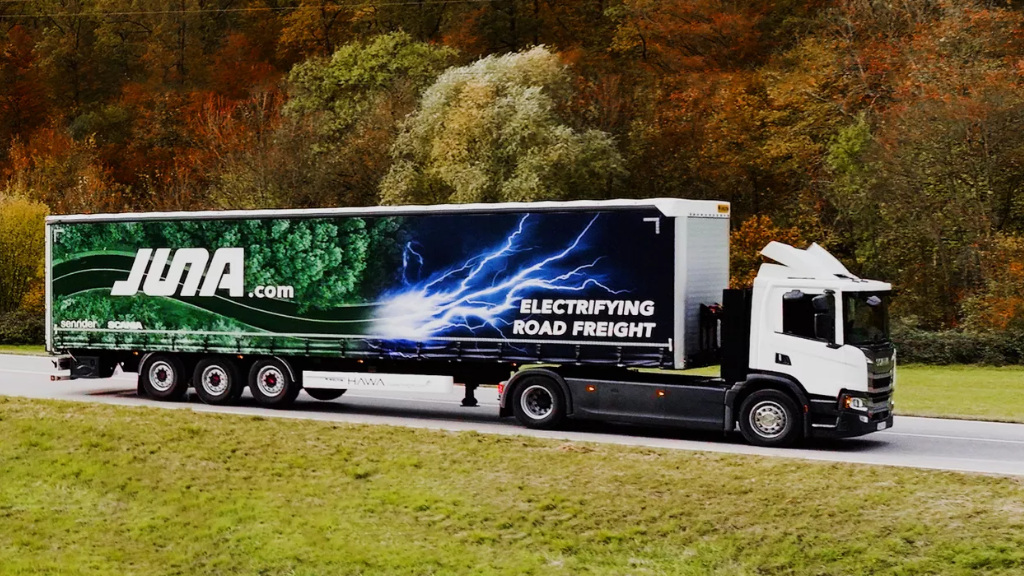sennder and Scania establish JUNA, a joint venture to accelerate decarbonization of European road logistics
Scania CV AB (“Scania”), a global leader in transport solutions, and sennder Technologies GmbH (“sennder”), a leading digital road freight forwarder in Europe, announce today that they have formed JUNA, a new joint venture to unlock electric solutions in road logistics across Europe. The joint venture, which has already successfully launched in Germany, aims to advance large-scale electric truck adoption in Europe and to drive the transition towards a sustainable logistics industry, in line with the goals of the European Union’s Green Deal to achieve climate neutrality by 2050.
JUNA, a Berlin-based company (GmbH), introduces an innovative pay-per-use model for electric trucks, which are two to three times more expensive than conventional vehicles, to effectively unlock large-scale electric truck adoption. JUNA enables access to electric trucks and guaranteed transport volumes, by granting access to spot and contract loads on sennder’s digital platform. In doing so, JUNA removes the obstacles of electric truck adoption for carriers, including the financial challenges associated with high upfront costs and residual value, and provides carriers with commercial predictability through guaranteed use. Leveraging Scania’s premium electric trucks and tailored services and sennder’s proprietary technology that connects small and medium carriers with shippers, JUNA combines the strength of both companies to accelerate the decarbonization of European road logistics. As early as 2024, JUNA will significantly increase the presence of e-trucks in Germany by providing up to 100 e-trucks to carriers via JUNA’s pay-per-use-model. By 2030, JUNA is aiming to deploy 5,000 electric trucks, significantly increasing the current number of electric trucks on the roads.
The innovative model offers a holistic package, including premium electric vehicle, repair, maintenance, insurance, digital and electric services, in addition to usage-based fees and sennder’s contractual commitment to ensure truck utilization, to transform the landscape for carriers. Through data analysis, JUNA optimizes electrification strategies and simulates routes for electric truck suitability. By removing the risks associated with electric truck adoption and streamlining operations, JUNA will play a pivotal role in reducing carbon emissions and advancing the transition to low-emission transportation.
A pilot program has recently been successfully launched with a first carrier driving a JUNA electric truck on renewable energy up to ten times a week for an FMCG shipper and sennder customer in the Stuttgart region of Baden-Württemberg, Germany. With the potential to achieve an annual reduction of 93 tonnes of CO₂e emissions for the first truck alone, the program’s scope will be expanded to encompass long-distance routes in 2024. The operation relies on existing public charging infrastructure in Germany, with per-kilometer costs comparable to current diesel expenses.
Gustaf Sundell, Executive Vice President and Head of Ventures and New Business at Scania, says: “JUNA is the result of a collaboration between two companies with complementary expertise in the areas of electric vehicles and digital logistics, which will accelerate the transition to electrified heavy transports. Scania is exploring new solutions to find ways of creating value for our customers now and in the future and we are proud to see this project with sennder come to life. We believe it will play an important role in driving the shift to a sustainable transport system.”
The two parties signed a joint venture agreement in May, and the necessary approval by the European Commission has been obtained.
Oroginal article HERE
Image source: sennder.com

